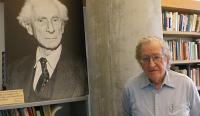In an interview with Kontext TV political scientist Norman Finkelstein examines the Israel-Palestine conflict, shows why there still is no Palestinian state and points out that Gandhian tactics in the Middle East conflict could work. “I don’t think they can do much. I think they’ll have a very hard time.” Today much more is known about the conflict, says Finkelstein. Too often Israel has chosen war over diplomacy and blocked a two state settlement while it is incorporating more and more Palestinian land. Furthermore Israel has become increasingly vulnerable to outside pressure due to human rights violations. Even though Finkelstein goes along with boycott strategies the BDS movement is advocating for he is critical of the movement’s political dishonesty. He insists on sticking to the two state solution following international law. The interview with Norman Finkelstein was conducted before the protests in Gaza in 2018 started.
Norman Finkelstein, political scientist from the U.S. and author of several books about the Israel-Palestine conflict. His latest book is: “Gaza. An Inquest into Its Martyrdom”
The perception of the Middle East conflict has changed radically in the last twenty years, says Finkelstein. Back then the conflict was described in fairly propagandistic terms. Thus Israel made the desert bloom - a kind of Indian and cowboy version of history. But this view is mostly gone as things are looked at in more realistic ways. In addition scientific research shows that Israel time and time again has chosen war over diplomacy. This is also true for the so called Six Day War in 1967 with Egypt when Israel attacked even when it was clear that Egyptian President Nasser did not pose a threat.
The so called peace process is in fact a peace blockade. Israel has never offered the Palestinians a viable state during the period of bilateral negotiations – from Camp David through Taba to Annapolis, states Finkelstein. To the contrary Israel has made expressively clear that it wants to keep the settlement blocks in the West Bank including the most arable land and water resources. But this would divide the Palestinian land into cantons and finally bury the any Palestinian state. But Israel couldn’t block the two state solution without the support of the U.S. while European countries are standing by idle. But the Europeans at least would have the right mindset when it comes to solving the conflict – in contrast to the U.S. But even they have to be moved to “make their actions cohere or correspond with their words”.
The attitude of Jews living in the U.S. has changed. The Honeymoon of American Jews with Israel is over, says Finkelstein. They could no longer bring their liberal stance in line with the aggressive conduct of the Israeli state. In addition the so called Goldstone report about the Gaza invasion in 2008 has shown that Israel is extremely vulnerable on the human rights issue. Non-violent resistance in the occupied territories would certainly put pressure on the government in Tel Aviv. „I think that Gandhian tactics can work.” Boycott measures could also be an instrument to bring Israel on course toward international law. But Finkelstein criticizes the BDS movement (BDS = Boycott, Divestment, Sanctions) since it doesn’t take a clear stance toward the state of Israel. Instead the movement wants to implement the full right of return of all Palestinian refugees which in the end would mean the elimination of Israel by stealth. But with such an approach one could never reach a broad public. Finkelstein therefore advocates for a two state settlement.
Almost two decades have been gone since Finkelstein published his book “The Holocaust Industry” which stirred a lot of discussions worldwide. Nowadays the thesis of the book would no longer been controversial, says Finkelstein. He wanted to show how the Holocaust has been used as an ideological weapon to deflect critique at the conduct of Israeli governments. Furthermore the genocide was a financial weapon, instrumental for the “shakedown of Europe” in the 1990ies. In doing so the Jewish Claims Conference in the U.S. was misappropriating money and not transferring the full compensation sums to the Holocaust survivors. Finkelstein, son of two Holocaust survivors, recalls how his mother got only three thousand dollars through the Jewish Claims Conference while his father received monthly checks directly by the German state until his death.









